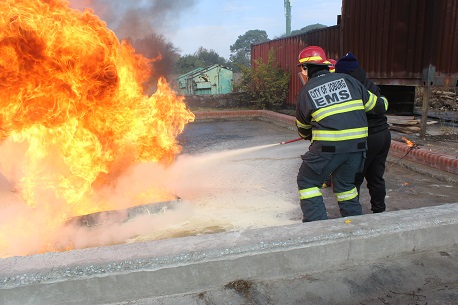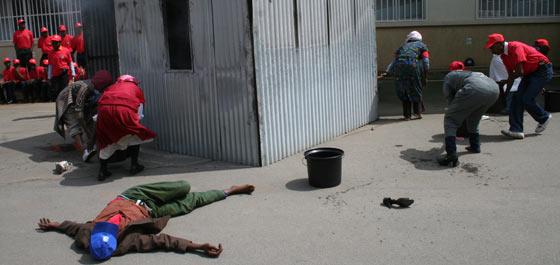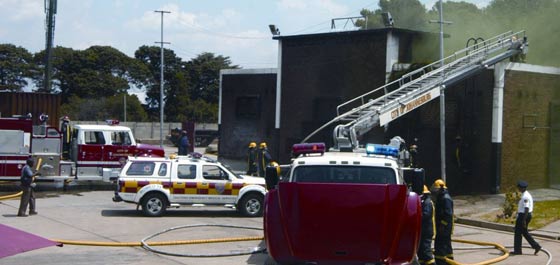Overview

The service can be contacted on 011 375 5911.
Operations is a core department, dealing with the saving of lives and property when disasters or accidents happen.
Proactive services and fire safety focuses on preventing fires.
Vision, mission and key objectives

Vision
- Create an end-to-end Customer Relationship Management Strategy;
- Emergency preparedness;
- Effective custodianship of the City’s by-laws and prescripts;
- Community empowerment;
- Transformed organisation; and
- Financial management.
Projects and programmes

|
The EMS is committed to providing a sustainable emergency service to all the citizens of Joburg. It contributes directly to the City’s vision and priorities through its reactive and proactive services.
Through its proactive services, the unit plays a direct role in changing residents’ perceptions of their own safety. Through its reactive services, it is committed to ensuring that response times of ambulance and fire services are world standard.
It continuously develops programmes and awareness campaigns to enhance service delivery. These are informed by the risk profile that the City develops and updates regularly to ensure consistent monitoring relevance of the services.
Some of the projects and programmes are:
Training Academy
EMS academies offers high level training in line with national and international standards, resulting in world accepted levels of competence in emergency management services. Courses on offer vary from basic fire fighting and first aid training to more advanced training in hazardous materials, vehicle rescue and basic ECG interpretation.
Courses
EMS has three training academies situated in Brixton, Rietfontein and in Florida where the following courses are on offer:
The following is offered:
The course is aimed at businesses and individuals wishing to obtain basic competence in the fields of first aid, firefighting and hazardous materials. Read more in the prospectus.
Medical training
Rescue training The course is aimed at employees within the emergency services industry wanting to specialise in technical rescue or person’s required to perform such rescues as part of their jobs, and individuals involved in outdoor activities requiring basic rope skills.
A number of high-adrenalin programmes are on offer:
|
|
All enquiries related to training should be directed to the Brixton Training Academy at 3 Brixton Road, in Brixton or
Commercial Training Academy
Post to PO Box 1496 Johannesburg, 2000.
Tel: 011 222 8104/8115/8110
nicom@joburg.org.za
|
Projects and programmes

|
The EMS is committed to providing a sustainable emergency service to all the citizens of Joburg. It contributes directly to the City’s vision and priorities through its reactive and proactive services.
Through its proactive services, the unit plays a direct role in changing residents’ perceptions of their own safety. Through its reactive services, it is committed to ensuring that response times of ambulance and fire services are world standard.
It continuously develops programmes and awareness campaigns to enhance service delivery. These are informed by the risk profile that the City develops and updates regularly to ensure consistent monitoring relevance of the services.
Some of the projects and programmes are:
Training Academy
EMS academies offers high level training in line with national and international standards, resulting in world accepted levels of competence in emergency management services. Courses on offer vary from basic fire fighting and first aid training to more advanced training in hazardous materials, vehicle rescue and basic ECG interpretation.
Courses
EMS has three training academies situated in Brixton, Rietfontein and in Florida where the following courses are on offer:
The following is offered:
The course is aimed at businesses and individuals wishing to obtain basic competence in the fields of first aid, firefighting and hazardous materials. Read more in the prospectus.
Medical training
Rescue training The course is aimed at employees within the emergency services industry wanting to specialise in technical rescue or person’s required to perform such rescues as part of their jobs, and individuals involved in outdoor activities requiring basic rope skills.
A number of high-adrenalin programmes are on offer:
|
|
All enquiries related to training should be directed to the Brixton Training Academy at 3 Brixton Road, in Brixton or
Commercial Training Academy
Post to PO Box 1496 Johannesburg, 2000.
Tel: 011 222 8104/8115/8110
nicom@joburg.org.za
|
Directorates
The Emergency Management Services (EMS) Directorates:
- Operations deals with the response to a wide range of incidents, such as fire, medical, rescue, water rescue and hazardous materials disasters. Employees are called FF/EMTs (firefighters and emergency medical technicians) as they fight fires and operate ambulances. Some are specially trained to cope with hazardous materials. Operations is also responsible for the Control Centre, which receives calls about disasters and dispatches emergency services
- Proactive Services and fire safety focuses on preventing fires. It focuses on code application, code enforcement and events management, among other aspects. Its main business is ensuring that buildings, building plans, transporting hazardous materials (hazmat) and events comply with fire safety laws.
- Corporate Services and Academy supports the EMS with a wide range of services, including training, fleet management, human resources, finance, administrative services and mess. Some of its key programmes are the chaplaincy service and employee assistance programmes.
- Strategic Support focuses on communications and marketing, quality assurance and research, transformation and employment equity, and special projects. Departmental planning, such as sector planning, business plans and scorecards, falls under this directorate. It also deals with organisational research, processes, capacity building, performance management, support, monitoring and reviews.
What is a paramedic?
|
Johannesburg’s EMS has three levels of emergency practitioners – basic, intermediate and advanced life support. Only the advanced life support practitioners are allowed to refer to themselves as paramedics. On the first level, practitioners (rendering basic life support) are called emergency medical technicians (EMTs). They are trained to a standard well above that of first aid practitioners and save many lives every year by applying basic life-saving skills like CPR and airway maintenance that are needed in most emergencies.
On the second level, emergency practitioners (rendering intermediate life support) are also called EMTs. These individuals are allowed to perform electrical defibrillation using ECG monitoring equipment and may set up intravenous pipes, and so on.
True paramedics render advanced life support. They are qualified to administer certain intravenous drugs and other advanced life-saving procedures.
Emergency medical services (ambulances)
Emergency medical services provides life support from a basic to advanced level throughout the city. Ambulances are manned by fire fighters/emergency medical technicians trained in basic or intermediate life support, while response cars are manned by advanced life-support paramedics. Emergency medical technicians and paramedics working in Johannesburg are among the most experienced emergency medical practitioners in the world as crews are constantly exposed to all forms of medical and traumatic emergencies.
|
|
Clifford Mokgatlhe: Deputy Director of Medical 011 222 8068/8067
Email: cliffordm@joburg.org.za
|
Public Information, Education and Relations (PIER)
Rather than wait for disasters to strike, PIER focuses on pre-incident training and preparedness geared towards training the public to avoid all types of emergencies and disasters, and cope with them when they happen.
Corporate Services and Academy Directorate
Training academy
Firefighters and emergency medical technicians (FF/EMTs) are trained in-house at the EMS’s academy in Brixton, Rietfontein and Florida Park. The academy is accredited national and internationally, and internationally accredited instructors conduct most levels of training.
There is also career-oriented training for existing staff and new recruits as well for private individuals who want to be trained as firefighters and emergency medical technicians. Ongoing classroom and on-the-job training is provided to ensure the highest level of competence in the use of expensive, state-of-the-art and sophisticated equipment, the aim being to optimise manpower and resources.
Strategic Support Directorate
Among the critical aspects in this directorate are communications and marketing, quality assurance and research, transformation and employment equity, and special projects.
Some of the work it does is departmental planning; for example, sector planning, business plans and scorecards. It also deals with organisational research, processes, capacity building, performance management, support, monitoring and review.
Communications and marketing
Communications and marketing deals with internal communication in the organisation. In line with City processes and protocols, it also deals with external communication to ensure the good image of the department. Another responsibility is establishing its branding policy.
Quality assurance and research
The ISO 9000 programme was adopted to ensure the customer gets the best service. The quality assurance division is responsible for implementing this programme and ensuring that all the necessary implementation, support and monitoring plans are in place. It also ensures that implementation is reviewed at the end of the programme.
Transformation and employment equity
To ensure that the department complies with the necessary transformation imperatives, the transformation and employment equity division looks at broader equity and the necessary interventions to ensure that the organisation is transformed.
Special projects
This division deals with all the organisational planning processes, like public safety sector plans, business plans and performance management. It also handles aspects like audits, process reviews and support programmes.
Physical Address:
Public Safety Headquarters
195 Main Road Martindale
Office of EMS Chief
Tel: 011 222 8041/8040
Email: xolilek@joburg.org.za or lesegots@joburg.org.za
Operations
Tel: (011) 222 8067/8068
Email: kediboneo@joburg.org.za or kanyisat@joburg.org.za
ProActive Services
Tel: 011 222 8087/80
Email: sagriem@joburg.org.za or luyandamot@joburg.org.za
Email: sonjal@joburg.org.za or mphomotlou@joburg.org.za
Disaster Management Volunteers

- Unit of volunteers;
- General volunteers; and
- Spontaneous volunteers.
- Orientation course;
- Basic first aid;
- Basic firefighting;
- Introduction to disaster management;
- Introduction to fire safety;
- Introduction to events management; and
- Introduction to public information, education and relations.
EMS by-laws

- Design and construction of buildings should encompass water drainage from buildings and access to facilitate fire-fighting and rescue.
- Provision should be made for the installation of sprinkler systems, extractor fan systems, emergency exits and fire-fighting equipment.
- Adequate water supply through the provision of reservoirs for fire-fighting purposes.
- Storage of flammable substances
All flammable liquid storerooms must be designed in accordance with the requirements of the City’s bylaws. No person may store or allow the storage of any flammable substance in any storeroom without:
- Compliance with the requirements of the by-laws and any other applicable law.
- The use of fireworks without authorisation is prohibited in certain circumstances.
- Fireworks displays must be authorised by Council at least 14 days prior to the proposed event.
- Application for permission to deal in fireworks must be made from the Chief or his / her nominee at least 30 days in advance.
- Flammable Liquid Installation plans must be submitted.
- A registration certificate will be issued on completion of the installation.
- Be in possession of a valid transport permit issued by the Chief Fire Officer in accordance with the National Road Traffic Act; and
- Ensure that the transport permit is available in the vehicle for inspection at all times.
- That person is in possession of a spraying permit (Section 80); and
- The spraying, coating, plating or epoxy-coating is conducted in a spraying room approved by the Chief Fire Officer on premises registered for that purpose.
- Contravenes or fails to comply with any provision of these by-laws;
- Fails to comply with any notice issued or displayed in terms of these by-laws;
- Fails to comply with any lawful instruction given in terms of these by-laws;
- Obstructs, hinders, or improperly influences or attempts to do so, any authorised representative or employee of the Council in the execution of his or her duties or performance of his or her powers or functions under these by-laws, is guilty of an offence and liable on conviction to a fine or in default of payment to imprisonment for a period not exceeding six months, and in the case of a continuing offence, to a further fine not exceeding R50, or in default of payment, to imprisonment not exceeding one day, for every day during the continuance of such offence, after a written notice has been issued by the Council, and served on the person concerned, requesting the discontinuance of such offence.
- Practise escape plans every month.
- Plan two ways out of each room.
- Immediately leave your home when a fire occurs.
- Never open doors that are hot to the touch.
- Designate a meeting location away from your home.
- Once you’re out, stay out!
Residential Fire Sprinklers
Homes can be built or even retrofitted to include low-cost automatic sprinkler systems connected to the domestic water supply. In addition to safety feature advantages, fire sprinklers reduce insurance premiums by 5 to 15 percent.
- EMS is expanding its disaster management volunteer cadre so that communities become agents of the disaster management in the city;
- EMS has a Disaster Management Forum and is part of the Provincial Disaster Management Forum;
- EMS conducts joint simulation exercises with businesses and other relevant agencies to ensure preparedness and mitigation;
- EMS conducts awareness sessions to prepare all stakeholders to mitigate disasters; and
- EMS has established partnerships with other key partners like the South African Weather Service and the Council for Scientific and Industrial Research.

